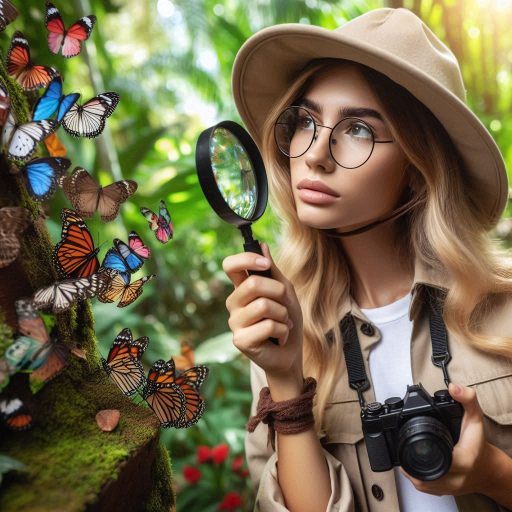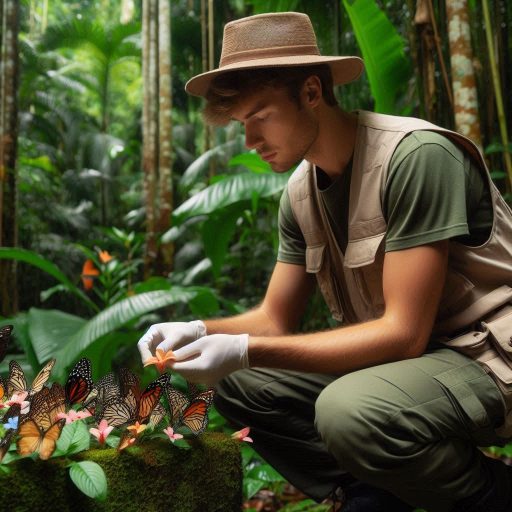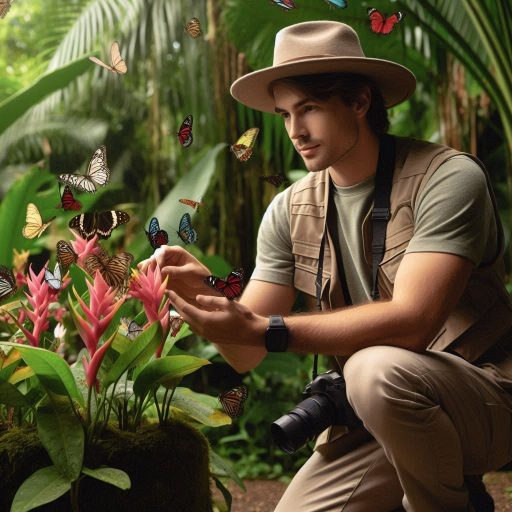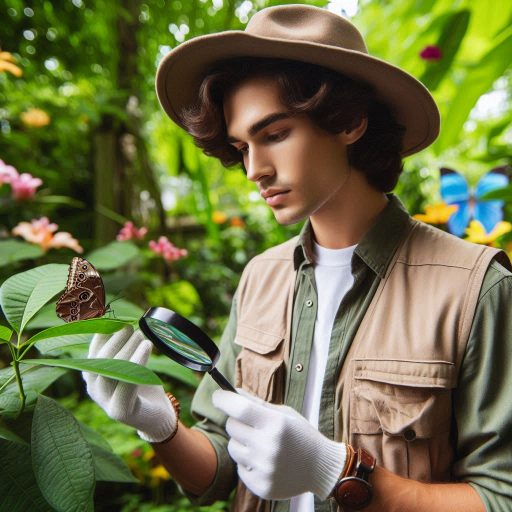Introduction
Zoologists study animals and their behaviors, interactions, and habitats.
They conduct research in the field and laboratories to gather data.
This research helps them understand animal life cycles, social structures, and ecological roles.
By observing wildlife, zoologists contribute to our knowledge of biodiversity.
Their work is essential for preserving wildlife and their habitats.
As conservation advocates, zoologists develop strategies to protect endangered species.
They assess threats to wildlife and recommend actions to mitigate these risks.
Through education and outreach, they raise awareness about conservation issues.
Zoologists collaborate with other professionals, including ecologists and veterinarians, to enhance their research efforts.
This teamwork leads to comprehensive approaches for addressing complex environmental challenges.
Their findings inform policies that promote sustainable practices and habitat restoration.
Additionally, zoologists engage the public through educational programs and community initiatives.
They inspire future generations to appreciate and protect wildlife.
The importance of zoologists lies in their ability to connect scientific research with real-world conservation efforts.
Their dedication ensures that ecosystems remain healthy and balanced.
Zoologists play a crucial role in studying and preserving wildlife.
Their expertise is vital for understanding and protecting our planet’s rich biodiversity.
Education and Training
Required Degree in Zoology or Related Field
Zoologists need a strong educational foundation to succeed in their careers.
Most zoologists hold at least a bachelor‘s degree in zoology or a related field, such as biology or ecology.
A zoology degree provides students with knowledge in animal behavior, genetics, physiology, and ecology.
Courses often include lab work, giving students hands-on experience with research methods and data analysis.
Hands-on Experience Through Internships or Research Projects
In addition to academic coursework, gaining practical experience is crucial.
Many students complete internships or research projects while in school.
These opportunities allow students to apply their classroom knowledge in real-world settings.
Internships often involve working with animals in wildlife centers, zoos, or research labs.
These experiences help students develop essential skills, such as observing animal behavior, conducting experiments, and collecting data.
Continuous Learning and Professional Development
Beyond the classroom and hands-on experience, continuous learning is vital in this field.
Zoologists must stay updated on new research and scientific discoveries.
Many professionals attend conferences, workshops, or seminars to keep their knowledge current.
These events also provide networking opportunities, allowing zoologists to connect with peers and share insights.
Pursuing advanced degrees can further enhance a zoologist‘s career prospects.
Many positions, especially those in research or academia, require a master‘s degree or PhD.
Graduate programs allow students to specialize in specific areas, such as marine biology, conservation, or animal genetics.
Through these programs, zoologists gain advanced research skills and deepen their understanding of their chosen fields.
Professional development does not stop after formal education.
Zoologists continue to refine their skills throughout their careers.
Many professionals join organizations such as the American Society of Zoologists or the Zoological Society of London.
These organizations offer resources for continuing education, including journals, online courses, and certifications.
Membership can also enhance a zoologist‘s credibility and demonstrate a commitment to staying informed.
Additionally, many zoologists participate in ongoing research projects, often collaborating with universities or conservation groups.
These projects help zoologists stay at the forefront of new developments in animal science.
Participation in research not only enhances a zoologist‘s skills but also contributes to the broader scientific community.
Overall, education and training are essential for a successful career in zoology.
A degree in zoology or a related field provides the foundation, while internships and research projects offer hands-on experience.
Continuous learning and professional development ensure that zoologists stay informed and capable of making valuable contributions to their field.
Through dedication to education, zoologists can pursue meaningful work that advances our understanding of the animal kingdom.
Daily Research Tasks
Observing Animal Behavior in Their Natural Habitats
A key responsibility for zoologists is observing animals in their natural habitats.
By spending time in the field, zoologists study how animals behave, interact, and adapt to their environments.
This research often involves long periods of observation to understand feeding, mating, and social behaviors.
Zoologists take detailed notes and use tools like cameras, drones, or GPS trackers to gather data.
These observations help zoologists track patterns and uncover changes in animal behavior over time.
Fieldwork may require zoologists to travel to remote locations.
Whether in tropical rainforests, savannas, or polar regions, zoologists must adjust to various environments.
Understanding the climate, vegetation, and surrounding wildlife is crucial to gathering accurate data.
Working in these environments also allows zoologists to see how animals respond to external factors like predators, weather changes, or human interference.
The data collected from these observations provide critical insights into the species and ecosystems under study.
Collecting Data on Population Dynamics and Ecosystem Health
Another important aspect of daily research for zoologists is collecting data on population dynamics.
Zoologists monitor animal populations to assess the size, age structure, and reproduction rates.
Tracking population trends over time helps researchers understand the health of species and whether populations are thriving or declining.
This data is vital for conservation efforts, as it helps identify species at risk of extinction or in need of protection.
Zoologists also assess ecosystem health by studying the relationships between species and their environments.
They collect data on food availability, predator-prey interactions, and habitat conditions.
This information helps determine how well an ecosystem supports the animals living in it.
Zoologists may take soil or water samples to test for pollutants or nutrient levels, providing insights into environmental changes that could impact animal populations.
Technology plays a major role in collecting and analyzing data.
Zoologists use tools like satellite imagery, tracking devices, and environmental sensors to monitor wildlife and ecosystems.
These tools allow researchers to gather more comprehensive data and track changes in real time.
Analyzing Findings and Documenting Research Results
After collecting data, zoologists spend time analyzing their findings.
They look for patterns in the behavior or population trends they’ve observed.
Statistical software helps zoologists identify correlations between animal behavior, environmental factors, and ecosystem health.
This analysis is essential for drawing conclusions about the species being studied.
Once the analysis is complete, zoologists document their results in research papers, reports, or presentations.
These findings are often shared with the scientific community, conservation organizations, or government agencies.
The results may inform policy decisions, conservation strategies, or further research projects.
Zoologists must present their findings clearly and accurately to contribute to the broader understanding of animal biology and conservation.
Zoologists’ daily research tasks involve observing animal behavior, collecting data on population dynamics, and analyzing and documenting their findings.
Their work provides valuable insights into the health of species and ecosystems, guiding efforts to protect and preserve wildlife.
Read: Interdisciplinary Research: Botany and Other Sciences
Conservation Efforts
Developing Conservation Strategies to Protect Endangered Species
A critical part of a zoologist‘s role is developing strategies to protect endangered species.
Zoologists study population dynamics, habitat loss, and environmental threats to understand what puts species at risk.
Based on their findings, they create tailored conservation plans.
These strategies often include measures like establishing protected areas, reducing human-wildlife conflicts, and supporting breeding programs for endangered animals.
Zoologists ensure that these plans address both the species‘ needs and the broader ecosystem.
Zoologists also work closely with local communities to implement these strategies.
They educate people about endangered species and the importance of biodiversity.
Through outreach programs, they encourage community involvement in conservation efforts.
This local support is essential for the long-term success of conservation initiatives, as it fosters a collaborative approach to protecting wildlife.
Advocating for Wildlife Preservation and Habitat Restoration
Advocacy is another important responsibility for zoologists.
They play a key role in raising awareness about the threats facing wildlife.
Zoologists communicate with the public, policymakers, and conservation groups to highlight the importance of preserving biodiversity.
By sharing their research findings, zoologists advocate for laws and policies that protect endangered species and their habitats.
Habitat restoration is a major focus of these advocacy efforts.
Zoologists often lead projects aimed at restoring damaged ecosystems, such as replanting native vegetation, removing invasive species, or cleaning up polluted areas.
Restoring natural habitats is vital for ensuring that endangered species have the resources they need to survive and thrive.
Zoologists monitor these restoration efforts, gathering data to measure their success and make adjustments as needed.
In addition to working on the ground, zoologists participate in global conservation movements.
They contribute to international efforts to address climate change, deforestation, and pollution, which are some of the biggest threats to wildlife.
By advocating for sustainable practices, zoologists help protect ecosystems that support endangered species.
Collaborating with Government Agencies and Conservation Organizations
Collaboration is essential to the success of conservation efforts.
Zoologists often partner with government agencies, such as wildlife services or environmental departments, to implement conservation policies.
They provide scientific expertise that informs regulations on hunting, habitat protection, and land use.
Zoologists help create policies that balance human needs with the goal of preserving wildlife.
Conservation organizations also play a key role in supporting zoologists‘ efforts.
Zoologists work alongside non-governmental organizations (NGOs) and international conservation groups to execute large-scale projects.
These collaborations often involve coordinating research, sharing resources, and launching campaigns to protect endangered species.
Zoologists may assist in fundraising efforts to support these conservation projects and ensure long-term sustainability.
Partnerships with conservation organizations allow zoologists to reach a broader audience.
Through joint efforts, they can raise awareness, mobilize volunteers, and secure funding for critical conservation initiatives.
These partnerships strengthen the impact of zoologists‘ work and enhance the effectiveness of global wildlife preservation efforts.
Zoologists contribute to conservation by developing strategies, advocating for preservation, and collaborating with various organizations.
Their work is vital to protecting endangered species and preserving ecosystems for future generations.
Read: Women in Botany: Celebrating Pioneers and Leaders
Animal Care and Welfare
Providing Enrichment Activities for Animals in Captivity
Zoologists play an important role in ensuring the well-being of animals in captivity by providing enrichment activities.
These activities are designed to stimulate animals mentally and physically, mimicking their natural behaviors.
By offering diverse environments and toys, zoologists help prevent boredom, stress, and frustration in captive animals.
Enrichment activities may include puzzles, scent trails, and novel objects that encourage animals to explore, forage, and problem-solve.
Zoologists often study an animal‘s natural habitat to create enrichment programs tailored to each species.
For example, primates may receive puzzles that require problem-solving to access food, while big cats may benefit from scent-marked areas that encourage hunting behaviors.
By observing how animals interact with these activities, zoologists continuously refine their enrichment programs to ensure effectiveness.
These efforts enhance the quality of life for animals in zoos, aquariums, and wildlife rehabilitation centers.
Monitoring and Ensuring Proper Nutrition and Health Care for Animals
Zoologists are responsible for monitoring the nutrition and overall health of animals in their care.
They work closely with veterinarians and nutritionists to develop balanced diets tailored to each species‘ specific needs.
Proper nutrition is essential for maintaining animals‘ physical and mental health.
Zoologists ensure animals receive the right amounts of vitamins, minerals, and proteins, adjusting their diets based on age, activity level, and health conditions.
Zoologists regularly check the animals for signs of illness or injury.
They conduct routine health assessments, including physical exams, blood tests, and behavioral evaluations.
If any issues arise, zoologists coordinate with veterinarians to provide prompt treatment.
Monitoring the animals‘ behavior is also key to ensuring their well-being.
Zoologists look for any signs of distress, such as lethargy, aggression, or changes in eating habits, which may indicate health problems.
Preventive care is another vital aspect of animal welfare.
Zoologists vaccinate animals, treat them for parasites, and maintain clean enclosures to prevent the spread of disease.
By ensuring proper nutrition and health care, zoologists help animals live longer, healthier lives in captivity.
Participating in Breeding Programs to Conserve Species Diversity
Breeding programs are a critical tool for conserving endangered species, and zoologists actively participate in these efforts.
These programs help maintain genetic diversity and increase population numbers for species at risk of extinction.
Zoologists carefully select breeding pairs based on genetic compatibility to avoid inbreeding and promote the healthiest offspring possible.
Once breeding begins, zoologists closely monitor pregnancies and provide specialized care for expectant mothers.
After birth, they ensure the newborns receive proper nutrition and socialization.
Zoologists also track the development of young animals, providing support and guidance to help them thrive.
Some breeding programs collaborate with other institutions, allowing zoologists to transfer animals between zoos to maintain genetic diversity.
By participating in breeding programs, zoologists contribute to the long-term survival of species.
These efforts help rebuild populations, eventually leading to the reintroduction of animals into their natural habitats.
Zoologists ensure animal care and welfare through enrichment activities, proper nutrition and health care, and breeding programs that conserve species diversity.
Read: How Climate Change Is Impacting Plant Research

Fieldwork and Travel
Conducting Field Research in Remote Locations
Zoologists frequently conduct field research in remote locations to study animals in their natural habitats.
These areas are often far from human civilization, providing zoologists with unique opportunities to observe wildlife without human interference.
This field research requires traveling to locations like rainforests, deserts, oceans, or mountains.
Each environment offers valuable insights into animal behavior and ecosystem dynamics.
Field research is essential for gathering data on species interactions, environmental conditions, and population health.
Zoologists use various tools, such as camera traps, drones, and tracking devices, to collect data in these remote areas.
The data collected is crucial for developing conservation strategies and understanding ecological systems.
Zoologists must be well-prepared to face the challenges posed by these locations, including difficult terrain and isolation.
Tracking and Studying Wildlife in Their Natural Environments
Tracking and studying wildlife in their natural environments is a critical part of a zoologist’s fieldwork.
Zoologists observe animals to learn more about their behavior, migration patterns, and social structures.
They often follow animals for extended periods, tracking their movements to gather important data on how they interact with their surroundings.
Zoologists use advanced technology like GPS collars and radio telemetry to monitor wildlife.
These tools allow researchers to track animals across large distances and study their daily routines.
By studying animals in the wild, zoologists gain insights into how environmental changes, such as habitat loss or climate shifts, impact species.
These findings help inform conservation efforts and provide the basis for protecting endangered species.
Field observations also allow zoologists to document rare behaviors and interactions, adding to the scientific understanding of each species.
This hands-on experience is invaluable for developing new theories and testing scientific hypotheses in real-world settings.
Adapting to Diverse Landscapes and Weather Conditions
Fieldwork requires zoologists to adapt to diverse landscapes and weather conditions.
Zoologists may find themselves working in extreme environments, from freezing tundras to scorching deserts.
Every location presents its own set of challenges, whether it’s the harsh winds of mountain ranges or the unpredictable rains of tropical forests.
Adapting to these conditions is essential for conducting successful research.
Zoologists must be physically prepared and equipped with the right gear to survive and thrive in these environments.
Proper clothing, reliable tools, and sufficient supplies are critical for enduring long fieldwork trips.
Flexibility is key, as weather changes can disrupt research plans and force zoologists to modify their methods.
Zoologists also need to understand the specific needs of the animals they study, as different species react to environmental conditions in unique ways.
By learning to adapt, zoologists can continue their research in the face of challenges, ensuring they gather the necessary data to inform conservation efforts.
Fieldwork and travel are integral to a zoologist‘s role.
Conducting research in remote locations, tracking wildlife, and adapting to diverse conditions all contribute to their understanding of wildlife and ecosystems.
These efforts provide crucial data for conservation strategies and scientific discovery.
Read: Exploring the Different Branches of Geology
Transform Your Career Today
Unlock a personalized career strategy that drives real results. Get tailored advice and a roadmap designed just for you.
Start NowCommunication and Outreach
Presenting Research Findings at Conferences and Workshops
Zoologists regularly present their research findings at conferences and workshops.
These presentations help zoologists share their discoveries with fellow scientists.
By explaining their research, they contribute to a deeper understanding of animal behavior, conservation, and ecology.
Conferences offer an excellent platform for zoologists to showcase their work and receive valuable feedback.
Through these events, zoologists exchange ideas and discuss challenges with experts in the field.
These interactions often lead to collaborations and new research opportunities.
Presenting findings also helps zoologists stay updated on the latest developments in their field.
Their work plays a key role in advancing knowledge and driving scientific innovation in zoology.
Engaging with the Public Through Educational Programs and Events
Zoologists actively engage with the public through educational programs and events.
They participate in school visits, community outreach, and zoo exhibits to raise awareness about wildlife conservation.
Their goal is to educate people about the importance of protecting endangered species and preserving ecosystems.
By explaining scientific concepts in simple terms, zoologists help non-scientists understand complex topics like habitat loss or climate change.
Public outreach also encourages people to take an interest in environmental issues.
Zoologists inspire future generations to become wildlife advocates and contribute to conservation efforts.
They use storytelling and hands-on activities to make learning fun and accessible for everyone.
Zoologists also engage the public through media appearances and online platforms.
They write blogs, contribute to documentaries, and participate in podcasts to reach wider audiences.
This visibility increases public awareness of wildlife and promotes actions that support conservation.
Writing Articles and Publications to Share Knowledge with the Scientific Community
Zoologists write articles and scientific papers to share their knowledge with the academic community.
Publishing in peer-reviewed journals ensures their research is thoroughly vetted and credible.
These publications help zoologists share their findings with other researchers, policymakers, and conservation organizations.
Writing requires clear communication and attention to detail.
Zoologists document their research methods, data, and conclusions so others can build on their work.
These publications contribute to the global body of knowledge on wildlife, helping shape future research and conservation strategies.
In addition to academic articles, zoologists write for popular science magazines and websites.
This makes their research accessible to the public, fostering a greater understanding of animals and ecosystems.
Writing for both scientific and general audiences allows zoologists to reach diverse groups and share their passion for wildlife.
Communication and outreach are crucial responsibilities for zoologists.
They present research, educate the public, and write publications to foster understanding and support for wildlife conservation.
These efforts help drive change and promote a better future for endangered species and ecosystems.
See Related Content: How to Become a Professional Soil Scientist
Explore Further: Famous Meteorologists: Pioneers and Modern Experts
Collaboration with Other Professionals
Working with Veterinarians, Ecologists, and Other Experts
Zoologists often collaborate with veterinarians, ecologists, and experts from related fields.
This collaboration enhances their understanding of animal health and ecology.
Veterinarians provide crucial insights into animal care and welfare, ensuring species receive proper medical attention.
Together, they assess health risks, diagnose illnesses, and implement treatment plans.
Ecologists contribute valuable knowledge about ecosystems and their dynamics.
They help zoologists understand the interactions between species and their habitats.
By combining expertise, zoologists and ecologists can develop comprehensive conservation strategies.
This teamwork fosters a holistic approach to wildlife management and habitat preservation.
Working with other professionals allows zoologists to address complex environmental issues.
They pool resources, share data, and collaborate on projects that require diverse skill sets.
This approach leads to innovative solutions for protecting endangered species and restoring habitats.
The collaboration also increases the effectiveness of conservation efforts by addressing multiple factors impacting wildlife.
Participating in Interdisciplinary Research Projects
Zoologists actively participate in interdisciplinary research projects that address critical conservation challenges.
These projects often involve collaboration with scientists from various disciplines, such as genetics, sociology, and environmental science.
By integrating diverse perspectives, they enhance the depth and impact of their research.
For example, zoologists may work with geneticists to study the genetic diversity of endangered populations.
Understanding genetic health is crucial for developing effective breeding programs and management strategies.
Similarly, collaborating with social scientists can help zoologists understand human-animal interactions and develop community-based conservation initiatives.
Interdisciplinary research projects often attract funding from various sources.
These projects demonstrate the collaborative nature of modern science and the importance of addressing complex problems.
By pooling resources and knowledge, researchers can tackle conservation challenges more effectively.
Sharing Resources and Expertise to Achieve Common Conservation Goals
Zoologists and their collaborators share resources and expertise to achieve common conservation goals.
This sharing allows for more efficient use of funding, equipment, and personnel.
Collaborative efforts can maximize impact and minimize redundancy in conservation projects.
For instance, zoologists may share research findings with conservation organizations to inform policy decisions.
They may also provide training and technical support to local communities working on conservation initiatives.
By empowering local stakeholders, zoologists help ensure the sustainability of conservation efforts.
Regular communication and collaboration among professionals foster a strong conservation community.
This network of experts can respond effectively to emerging challenges and share best practices.
By working together, zoologists and other professionals can amplify their efforts and create lasting positive change for wildlife and ecosystems.
Collaboration with other professionals is vital in zoology.
Working with veterinarians, participating in interdisciplinary projects, and sharing resources enhances conservation efforts.
Through these collaborations, zoologists can achieve their common goals, protecting biodiversity and promoting a sustainable future for all species.
Conclusion
Zoologists have varied responsibilities and duties that shape their daily work.
They conduct field research, observe animal behavior, and track wildlife.
They also focus on conservation efforts, developing strategies to protect endangered species.
Providing animal care and welfare remains crucial to their roles.
Zoologists engage in communication and outreach, sharing their findings with the public and other professionals.
Collaboration with veterinarians, ecologists, and experts from different fields enhances their research and conservation efforts.
Through interdisciplinary projects, they address complex challenges and achieve common goals.
The impact of zoologists extends beyond research; they play a vital role in educating communities about wildlife preservation.
Their work contributes significantly to understanding animal behavior, ecosystem health, and conservation strategies.
Zoologists help protect biodiversity and ensure the survival of many species facing threats.
As they explore the intricacies of wildlife, they inspire others to appreciate and advocate for nature.
Zoologists‘ diverse responsibilities highlight their essential role in wildlife conservation.
Their dedication helps safeguard our planet‘s rich biodiversity for future generations.
Through their efforts, they foster a deeper connection between people and the natural world.
[E-Books for Sale]
The Big Book of 500 High-Paying Jobs in America: Unlock Your Earning Potential
$19.99 • 500 High-Paying Jobs • 330 pages
Explore 500 high-paying jobs in America and learn how to boost your career, earn more, and achieve success!
See All 500 High-Paying Jobs of this E-Book
1001 Professions Without a Degree: High-Paying American Jobs You Can Start Now
$19.99 • 1001 Professions Without a Degree • 174 pages
Discover 1001 high-paying jobs without a degree! Unlock career tips, skills, and success strategies for just $19.99!




